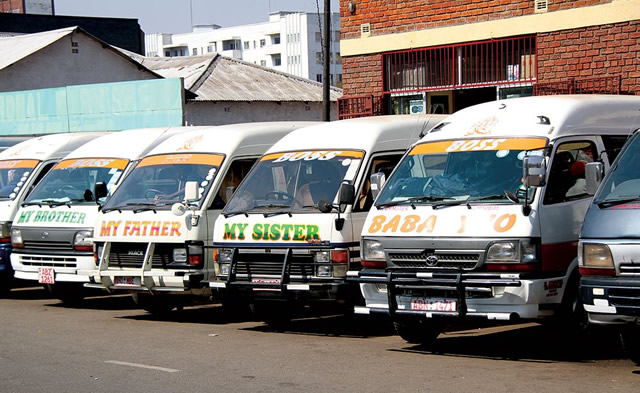Banning kombis not the solution

 Factmore Dzobo
Factmore Dzobo
THE plan by the government to introduce a transport policy, which among its major tenets is to ban kombis in most of the country’s urban areas, although still in its consultation stages, has torched a storm among public transporters and commuters who feel the move is not practical and will reverse the country’s indigenisation policy among other challenges.
The Zimbabwe National Transport Policy says high volume buses operated by a limited number of private players will replace kombis, a move envisaged to put to rest the current chaos in the sector.
For the past few years, traffic police in Bulawayo have been having running battles with errant commuter omnibus drivers flouting traffic laws and evading arrest.
This has resulted in law enforcement agents throwing tyre deflators or spikes in the process placing the lives of commuters in danger.
The failure by law enforcement agents to stop commuter omnibuses from parking and picking up passengers from undesignated areas continues unabated.
Unroadworthy kombis continue to ply various routes day in and day out, putting many passengers at risk.
The government envisages ending some of these irregularities in the public transport sector by introducing the transport policy set to ban kombis by 2016.
The policy is expected to introduce metro buses to replace kombis operating under one mass public transport system. The move is also expected to de-congest the city traffic flows and reduce accidents.
Bulawayo United Residents Association chairperson Winos Dube welcomed the move saying it would bring competition in the transport sector. He said the mass public transport system was convenient for managing and monitoring the kombis’ operational activities.
“If the policy satisfies the commuters, I find no problem with it. Yes it will be very unfortunate to introduce a policy which might disadvantage some businesspeople who used to survive from the kombi industry, but I believe it might not be necessary to ban the kombis. Instead, let it be an opportunity for competition,” said Dube.
The Bulawayo City Council (BCC) envisages registering all kombis under two associations, Tshova Mubaiwa and Bulawayo Urban Public Transporters Association (Bupta) a move which it says will also reduce chaos in the sector.
Bupta secretary general Albert Ncube said the move to ban kombis would defeat the purpose of indigenisation and worsen the plight of the already poverty-stricken people caused by the continued closure of industries in the city.
“The move is tantamount to reversing the country’s indigenisation benefits. The government should first do some serious consultations before introducing the policy. As a citizen of this country, I don’t see anything good except bringing misery to the already starving majority of the people surviving from this sector,” said Ncube.
Kombi and taxi businesses have of late become one of the thriving industries in Bulawayo. Motorists and other experts say the move cannot be a workable solution to decongesting cities but would worsen the problems already bedeviling the urban transport sector in Zimbabwe.
Traffic and Consultative Forum vice chairperson Albert Sibanda said the problems caused by kombi operators can only be solved by enacting structures which deal with public transport operations.
“We don’t support the government’s proposal to ban kombis as a way of returning normalcy to the transport sector. At the moment, we’ve a public transport policy administered by the BCC, though it hasn’t been working effectively in bringing normalcy to the urban public transport system. Such structures can work meaningfully to craft some code of conduct for the public transporters,” said Sibanda.
He added that the Bulawayo Transport Association looks after the interests of the public transporters and commuters and can be useful in reducing the friction between urban public transporters and law enforcement agencies.
A city tout who operates at one of the popular undesignated pick up points along 6th Avenue and Hebert Chitepo Street said the banning of kombis would increase the incidences of crime in the city as many youths would be left jobless.
Effort Moyo, a commuter omnibus operator said the banning of kombis was not the panacea to problems in the sector. He said kombis should not be banned but allowed to operate as one mass public transport regulated body as envisaged by the local authority.
“Banning kombis isn’t the solution to ending the disharmony in the public transport sector; the only way to go is to follow the idea of having a mass public transport system being advocated by the BCC. Kombis were introduced in the public transport sector because they provided convenience to passengers to and from work timeously. Some commuters can’t endure metro bus timetables which take time to attract enough passengers before departure. The kombi business has become a more viable industry than that of conventional buses,” said Moyo. Sometime in 2012, the BCC crafted the Bulawayo Public Transport Policy which among its major roles was to merge kombi operators into one mass public transport entity supervised by the local authority.
The policy was also meant to ban touts and get rid of pirate taxis who were taking business away from registered public transporters. Under the policy, the local authority said it would reduce traffic congestion in the central business district by leaning towards a mass public transportation system that would also involve the re-introduction of 35-seater metro buses.
Kombis were introduced in the early 1990s to complement Zimbabwe United Passengers Company (Zupco) which was running the urban transport sector but faced operational challenges.









Comments